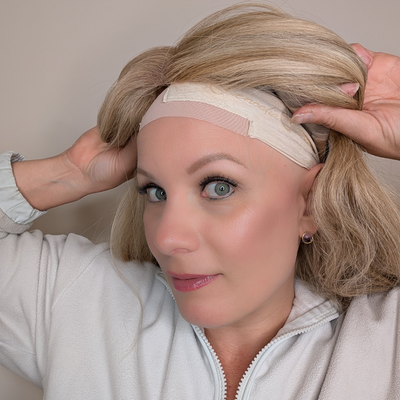What is A Medical Wig?
A medical wig is a wig that is used for medical reasons and not for cosmetic (fashion) reasons.
A medical wig, known as a cranial prosthesis, is a medical term for a wig. While "cranial prosthesis" is the most common medical term for wigs, there are other terms, like hair prosthesis, scalp prothesis, cranial implant, medical wig, hair prosthesis, and full cranial prosthesis. They all mean the same thing, a wig that is used for medical reasons and not for cosmetic (fashion) reasons.
While some women wear wigs for cosmetic reasons, the majority of us are wearing wigs because we have progressive or advanced hair loss due to medical conditions like alopecia, cancer, chemotherapy, lupus, thyroid, or androgenic alopecia or female pattern baldness.
Medical Wig FAQs
No, the term medical wig, or cranial prosthesis, is just the medical term for a wig. Unfortunately, there are no regulations or requirements for "medical wigs" or "cranial prosthesis", which makes it very confusing for consumers because it's hard to know if they are buying a "medical wig" or just a normal, ready to wear wig.
There are two main categories in the wig industry:
- Hair replacement segment often sells hair systems (cranial prosthetics, medical wigs, custom hair systems) that are often custom made and sized. The "systems/units" are semi-permanent, so they need to be applied and removed (bonded on) by a professional using adhesive and tape. Hair replacement systems tend to be expensive with annual membership, monthly service fees, and custom hairpieces. The monthly maintenance that is required is time consuming and many customers often feel "chained down" and dependent on maintenance.
- Ready to wear segment sells wigs knowns as fashion wigs, costume wigs, daily wear units. These wigs are pre-sized, pre-styled and are designed to be worn out of the box. These wigs tends to be budget friendly because they are mass-produced. This segment is flooded with sea of sub-par wigs that often look fake, fit poorly and they tend be very itchy.
Again, there are no regulations or industry requirements for "medical wigs". But, in general, medical wigs should be made for long-term, daily use for people with hair loss due to medical conditions like alopecia, chemotherapy, lupus, etc.
Sadly, because there are no regulations any wig can be sold as a medical wig so it is very important for you to educate yourself on the inter-makings of a high-quality wig. In general, you want to find a wig the is comfortable, looks real, and fits you well. It seems simple, but, it's shockingly hard to find.
At Encelia, we see things that we like and don't like in both segments.
The bonding mentality that the hair replacement segment centers itself around plays with our ultimate fear, that our wigs are going to fall off in public. They also cater to the shame that women feel about being bald, ultimately trying to convince us that we need to bond or conceal our hair loss at all times and at all costs. Women often feel chained down or reliant on their hair system and we often see women that have severe reactions to the adhesive that are used.
Moreover, we don't like seeing the sea of sub-par, mass produced itchy, poorly sized and fake looking wigs that flood the ready to wear market.
At Encelia, we are on a mission to move this industry forward by bringing you to the best of both segments. The freedom and convenience that the ready to wear market provides. And the fit, realism and security that the hair replacement market provides.
We offer five caps sizes so our wigs will fit you well, eliminating the need for messy adhesives. We prioritize comfort; Encelia is the only wig brand that uses materials and sewing techniques that are commonly used in the performance athletic industry, as a result, our wigs are stretchable, breathable and move with you. Finally, we believe all wigs should look-natural regardless of the price so we pay close attention to details like the hairline, top, density and overall hair quality.
We believe these aspects should be the STANDARD, and not a LUXURY.
Check out our wig guide here, which highlights what makes a good wig vs a bad wig.
At Encelia, we believe medical wigs should be comfortable, secure, and natural-looking. It's the little things that make all the difference like:
COMFORT
- Consider double-lined wigs. Our wigs are double lined with a cooling mesh that is moisture wicking and quick drying so it's buttery soft, breathable and lightweight.
- Seamless edges nothing is worse than a wig that is stiff or one that digs or rubs against your head.
SECURITY
- Size matters | We believe medical wigs should be secure without the need for glue, adhesive or wig grips. We find that most women are actually pretty allergic to adhesives and we personally like the freedom and independence of not relaying on a "professional" to bond a piece down. Basically, if a wig fits you well, you honestly don't need to bond it. The hair replacement industry likes to play on our biggest fears.
REALISM
- It goes without saying, a wig should like natural regardless of the price point. At Encelia, all of our caps are the same across the board regardless of the hair type or your price point. Simply put, a wig should be comfy, fit well, and look natural.
STEPS TO GET YOUR WIG COVERED BY INSURANCE
While there are some insurance companies that allow wig coverage for medical hair loss, most do not. Most insurance companies follow the standard set by Medicare guidelines, and since Medicare does not allow coverage of wigs, most insurance companies have the some positioning.
Medicare gets their direction from Congress and currently, there is a bill in Congress, House bill, H.R. 4034 and Senate bill S. 1922. that would allow Medicare coverage of wigs.
The absolute best way to get your wig covered by insurance is to go to the H.R. 4034 bill page, and click on the Contact Your Member under the "Give Feedback On This Bill" section, enter in your information and then reach out to your local Congress members.
Let your Representative and Senators know that you suffer from medical hair loss and that a wig is essential to helping you live a normal life. Explain to them how different you are treated when you don't wear your wig and how wearing one helps you feel normal. It's important for us to educate Senators and explain to them why we need wigs and help them understand that we do not wear wigs for cosmetic reasons but instead we wear wigs to feel normal and how, like other prosthesis, a wig helps us feel normal and socially accepted.
No, we're currently working very hard to become an in-network provider for several insurance groups, but, because cranial prosthesis/medical wigs are not covered by most insurance groups. Therefore, most insurance groups will not add any providers under this DEM category.
This means that Encelia Hair is considered to be an out-of-network provider for cranial prosthesis/medical wigs under the Durable Medical Equipment (DEM) category, which means you would be reimbursed after you file a claim with your insurance company. After you make a purchase, Encelia Hair will provide you with a PDF version of your receipt. You would submit your receipt along with your Doctor's prescription to your insurance provider for reimbursement.
If your claim form asks for a provider name, ours is Encelia Hair LLC. If you need our NPI number or our Tax ID number, please email or call us. Email help@enceliahair.com or call 858.356.2290, Monday–Friday, 9:00 a.m.-5:00 p.m. PST.
Note: If you are reviewing your insurance policy and do not see cranial prosthesis listed, this does not automatically mean that you don’t have coverage. We highly recommend calling your Health Insurance Provider and getting pre-authorization.
Call and ask:
- Does my policy covers a cranial prosthesis? Or other terms like other terms, hair prosthesis, scalp prothesis, cranial implant, medical wig, hair prosthesis, and full cranial prosthesis.
- If yes, when is a "cranial prosthesis" is covered? (i.e. for chemotherapy, burns, etc.
- Is it for any wig or for a specific wig like synthetic wigs or human hair wigs, etc.)
- How much will they cover? Full, partial, or a specific dollar amount?
- What specific terminology do they need in the "prescription" for the wig? (full cranial prosthesis or hair prosthesis, etc.)
- What specific documentation do they need you to submit with your claim?
- First, determine the specific terminology your Health Insurance provider requires.
- Ask your doctor or physician for a prescription. Make sure your prescription includes the medical procedure code (common codes are A9282 or D5924).
- Don't say the word, "wig". Make sure the prescription does not say “wig.” The term "wig" is commonly known or referred to as a fashion item, meaning your wig is not medically necessary causing your claim will be denied.
- Explain why the wig is medically necessary: Write a letter explaining your hair loss and its effects on you; stating that it is not simply for cosmetic reasons but for emotional well being and then ask your physician to sign this letter.
In order to be reimbursed, you need to file a claim with your insurance company.
What you need to do:
1. Obtain from your Doctor a prescription for a “Cranial Prosthesis” which includes your medical diagnosis
that has caused your hair loss.
2. Contact your Health Insurance Company to find out what they will reimburse for a
- Cranial Prosthetic – billing codes S8095 and A9282
3. Take pictures of yourself without the wig to show that your claim is medically related and is not for
cosmetic purposes.
If your claim form asks for a provider name, ours is Encelia Hair LLC. If you need our NPI number or Tax ID please email or call us. Email help@enceliahair.com or call 858.356.2290, Monday–Friday, 9:00 a.m.-5:00 p.m. PST.
GENERAL REIMBURSEMENT TIPS
- Take notes of conversations, specific language when you speak with your insurance provider.
- Follow up with your insurance provider consistently to get updates on the status of your claim.
- Keep copies of all of your documentation and invoices from your physician and from Encelia Hair.
Yes, wigs are eligible. FSAs and HSAs cover Cranial prostheses under their health category and you can expense up to $2,500.
If your medical bills are over 7.5% of your income than your wig is tax deductible.
- Keep copies Encelia Hair receipt and Doctor's prescription for tax exemption purposes.
- Speak with your tax advisor about your medical bills learn about all tax deductions that are available to you.
Prior to making a purchase, if you email us your at Doctor's prescription we will remove the sales tax with your order.
- Email us at help@enceliahair.com
- Send us your Doctor's prescription. We need a copy of your Doctor's prescription for auditing purposes.
Yes, Encelia Hair offers financing options through Affirm and Klarna - learn more here.
- Learn more about how Affirm works - here.
Many hospitals and cancer centers have private wig banks, which provide wigs to people in need with a free. Contact your local hospital or care coordinators to learn more about programs in your area.
Alternatively, you can also reach out to Naaf and the American center society to learn about their wig donation programs.
WHAT INSURANCE COMPANIES COVER WIGS?
Blue Cross Blue Shield does not cover wigs as a cranial prosthesis for group and individual insurance plans.
Aetna's group medical insurance plan does not cover wigs as a cranial prosthetic. However, individuals should verify with Aetna that the individual plan they are on will cover this item or not.
United Healthcare does not cover cranial prosthesis under group medical insurance plans. However, individuals should verify with United Healthcare that the individual plan they are on will cover this item or not.
Medicare will not pay for a cranial prosthetic wig even if the claim is filed under durable medical equipment. This means that anyone over 65 years old that has a medicare advantage plan or a medicare supplement plan, these plans will not pay for a wig. This has been confirmed by a Medicare Representative.
Ambetter does cover cranial prosthetic wigs under individual policy plans. Check with your insurance representative to see if your plan includes cranial prosthesis coverage.
Humana does not cover cranial prosthesis under their group insurance plans.
Baylor Scott & White does not cover wigs as a cranial prosthesis.
Oscar does cover 50% of cost for cranial prosthetic wig under individual policy plans and group medical plans. Check with your insurance representative to see if your plan includes cranial prosthesis coverage.
Molina does not cover cranial prosthetic wigs under individual policy plans.
Cigna does not cover cranial prosthetic wigs under individual policy plans.
*pending verification
*pending verification
ChampVa does cover cranial prosthetic wigs that are approved through their online system. Check with your insurance representative to see if cranial prosthesis is included.
TriCare does cover cranial prosthetic wigs under individual policy plans. Check with your insurance representative to see if your plan includes cranial prosthesis coverage.




